A Pediatrician's Perspective on Baby-Led Weaning with Jessica Simkins, MD
In this episode we're talking about:
- How to talk to your doctor about baby-led weaning…even if they don't love the idea
- Why baby-led weaning works for some families but may not be for everyone
- What to say if you're feeling pressure to start solid foods before your baby is ready
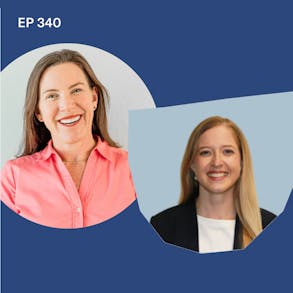
LISTEN TO THIS EPISODE
Episode Description
What is your doctor’s take on starting solid foods? Do they like baby-led weaning, or prefer spoon-feeding of purees? In this episode I’m chatting with pediatrician and baby-led weaning mom Jessica Simkins, MD about her own perspective on starting solid foods. If you’re not sure how to talk to your doctor about baby-led weaning, Dr. Simkins has some great advice and recommendations in this episode.
About the Guest

- Dr. Jessica Simkins is a Medical Doctor and pediatrician practicing in the New York City area
- She is a proponent of baby-led weaning and did this approach with her own child
Links from this Episode
- Baby-Led Weaning with Katie Ferraro program with the 100 First Foods™ Daily Meal Plan, join here: https://babyledweaning.co/program
- Baby-Led Weaning for Beginners free online workshop with 100 First Foods™ list to all attendees, register here: https://babyledweaning.co/baby-led-weaning-for-beginners
Other episodes related to this topic:
- How to Talk to Your Pediatrician About BLW with @pedsdoctalk Mona Amin, DO at https://blwpodcast.com/episodes/96

Latest Episodes
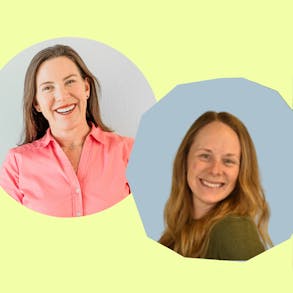
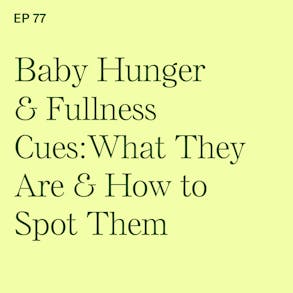
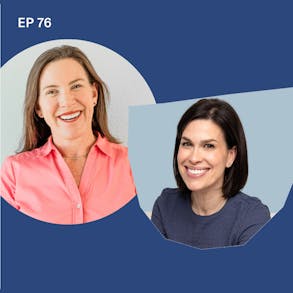
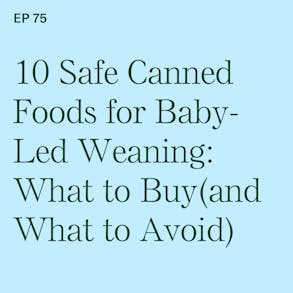
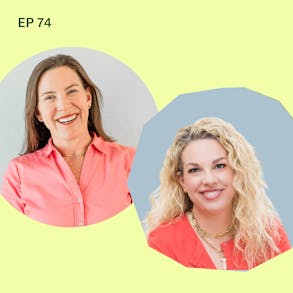
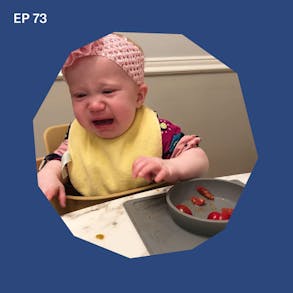
Katie Ferraro (1s):
Anyone have a picky eater. A mom who signed up for my workshop this week said wasn't brave enough to try baby-led weaning with my firstborn, who's now a picky eater. Second baby turned six months. Soon I want to provide him with the resources to do baby-led weaning. If, you are looking for those resources too. They're all inside of my free online video workshop called Baby-Led Weaning for Beginners. We're gonna cut through the confusion and set the record straight about starting solid foods safely so you can finally stop hunting and pecking all around the internet. For your answers. sign up for this week's workshop times at https://babyledweaning.co. I'll see you there.
Puffworks (32s):
Okay, If, you have not yet introduced your baby to the potentially allergenic foods peanut or tree nuts. Stop what you're doing. I have good news. Puffworks Baby is having a big sale and right now you can get 20% off the Puffworks Baby Peanut Puffs or Puffworks Baby Almond Puffs now through June 11th with the affiliate Discount code BLWBOOTCAMP. I love the Puffworks Baby Puffs because they have no added sugar, just a smidge of sodium for preservative and they are the softest puffs on the market. So they dissolve really easily in your baby's mouth and they're safe to use even before your baby has teeth If. you head to https://puffworks.com and use the code BLWBOOTCAMP. You can get 20% off now through June 11th. That's BLWBOOTCAMP at https://puffworks.com.
Jessic Simkins (1m 18s):
It's theoretically easier on parents. It should be the default to be able to feed a modified version of whatever they're eating and it helps to encourage the entire family to feed well. So it's actually an optimal public health intervention. So it makes it interesting that I never heard about it in the public health realm before my private practice.
Katie Ferraro (1m 37s):
Hey there. I'm Katie Ferraro, registered dietitian, college nutrition professor and mom of seven specializing in baby led weaning here on The Baby Led Weaning Made Easy Podcast I help you strip out all of the noise and nonsense about feeding, leaving you with the confidence and knowledge you need to give your baby a safe start to solid foods using baby-led weaning. So what is your own Pediatrician stance on starting solid foods? It's kind of crazy how varied doctors can be. Some are saying crazy stuff like start at four months in spoon feed white rice cereal and wait three to five days. But the vast majority of pediatricians are giving really solid advice about safely starting solid foods.
Katie Ferraro (2m 23s):
And today's guest is Dr. Jessica Simkins. She is A Pediatrician, she's also a mom of a now one-year-old and she did baby-led weaning with her baby, so she'd always been a proponent of it. She has a nutrition background, which she'll tell you a little bit about, but when it came to starting solid foods with her own baby, she's sharing in this interview about how it really kind of opened her eyes to the possibilities of all the foods that babies can eat. And so this is just a conversation sharing one pediatrician's perspective on baby-led weaning. Her name is Jessica Simkins and she is from the New York area and I just really loved chatting with her because I am so inspired by the work that pediatricians do and we are kind of chatting after the interview like there's so much work that pediatricians have to do that sometimes the solid food stuff gets boiled down to as little as two minutes that conversation.
Katie Ferraro (3m 10s):
But what are the most important things for doctors to know? So this is an important conversation I think for other pediatricians to hear, but also for parents. If you're struggling about how to talk to your doctor about starting solid foods, hopefully this conversation with Dr. Jessica Simkins will help.
Jessica Simkins (3m 28s):
Hello, it's great to be here.
Katie Ferraro (3m 30s):
So I'm excited to chat a little bit about your perspective on starting solid foods as a Pediatrician and a mom. But before we get started, could you share a little bit about your professional history and what you do for work?
Jessica Simkins (3m 41s):
Yes, do a brief bit of my educational history too, just cuz it's relevant to this talk. I was a nutrition major in college, so I started out there becoming interested in all of this and I was always interested in it. Always liked eating healthy as a kid. My mother made me broccoli and the microwave in a bowl of hot water every night and I don't know, it just kind of clicked for me. So I was really interested in it in college. Went into medical school, I took an extra year to do my master's of public health during my medical school training and I went specifically to Yale at the time where the Rudd Center for Food Policy and Obesity was. So I was really interested in still in the food realm at that time.
Jessica Simkins (4m 21s):
I did my residency after medical school and pediatrics. I love kids and I also know that families are very motivated to keep their kids healthy even more so themselves, but it often trickles down to everybody. So seems like a good place to start. And so as far as my professional history goes, after my residency training, I've worn a couple different hats. I, I started out working in the public health realm. I worked for the New York City Department of Health as a school health physician. Then I transitioned into a more of a clinical Pediatrician role in a foster care agency. I was also working at the time as a newborn hospitalist working in the hospital with some newborn nursery babies as well as in the labor and delivery when the babies first come out.
Jessica Simkins (5m 3s):
And then I transitioned into private practice, which is where I am now.
Katie Ferraro (5m 7s):
So do you see primarily newborn babies, infants children? Is it a mix of everything? What's your patient load like right now?
Jessica Simkins (5m 12s):
A mix of everything. We see all ages zero to 21. Basically as soon as they leave the hospital they come to us and we continue to see them for all their well visits, sick visits, very traditional.
Katie Ferraro (5m 24s):
So wait, pediatricians see people up until 21? I don't know why. I guess I just thought it stopped at 18.
Jessica Simkins (5m 30s):
We do see up till 21, we generally keep the kids who have gone off to college and they come home for breaks and they wanna see their doctor to get their their checkups. But we try to encourage them to start thinking about seeing an adult doctor becoming
Katie Ferraro (5m 43s):
An adult. Yes. Wonderful. So I know we were emailing back and forth before this interview and you had mentioned that you did baby-led weaning with your own child. So could you just share what inspired you to take this approach versus conventional adult led spoon feeding?
Jessica Simkins (5m 56s):
Yeah, I first heard about baby-led weaning when I started working at my practice now and my colleague told me, you know, there's this trend that's really popular, you should probably know about it. Before this I had been working more in a public health realm, so I hadn't really heard about more of the individual side of baby-led weaning. And so I was doing some long drives at the time. And so I needed, I liked podcasts, found yours. The rest seems to be history, you know, I just fell in love with it. It made a lot of sense to me. It clicked immediately and it seemed like the natural way to feed it seemed economical. It wasn't pushed by any one particular industry, which always gives me,
Katie Ferraro (6m 38s):
yep,
Jessica Simkins (6m 38s):
a lot of reassurance. It's theoretically easier on parents, it should be the default to be able to feed a modified version of whatever they're eating and it helps to encourage the entire family to feed well. So it's actually an optimal public health intervention. So it makes it interesting that I never heard about it in the public health realm before my private practice.
Katie Ferraro (6m 56s):
So Dr. Simkins, we know that you know interest in baby-led weaning, certainly on the rides, there's actually one survey that found that over 70% of parents have heard of baby-led weaning, almost 50% have attempted some form of baby-led weaning. What sort of questions do patients come to you asking about starting solid foods? Or maybe another way to phrase that question is how do you approach the conversation with your parents and your patients about starting solid foods for their babies?
Jessica Simkins (7m 20s):
So I would say the most common question I get is just when do I start? And I get that all the way from the very first visit to the six month visit and everything in between. Parents are really eager not only to start that experience of solid foods, they, they're so excited to start solid foods, but they're also eager to start Weaning down off of whatever they're feeding their babies with, otherwise breastfeeding or or formula. And so they are thinking about it from a very early age. And as far as how I introduce it, if a parent doesn't necessarily bring it up to me right away, I do try to start talking about it at the four month visit when parents are at that time period where other people might start suggesting that they start solid food and they might think that they're supposed to be starting solids and generally they're asking me about it then too.
Jessica Simkins (8m 8s):
So the most important thing that I want them to know is that safety is key. And the easiest way I find to pair that down to a small sound bite type answer is that I want them sitting comfortably in their high chair without falling sideways. It gives them an easy visual and I could show them by in my own body how I would have trouble eating if I was slouched down to the side if I didn't have the strength to keep myself upright and how I would be more at risk for choking if that were the case. So this makes it really simple for parents to say, okay, this is what I'm looking for. I can go from here and then I feel comfortable saying that, you know, whatever timeframe that happens on is fine, just go ahead and start If. you don't see me before then, but most likely it will happen after or around six months.
Jessica Simkins (8m 52s):
So they know around the timeframe that I expected to happen and they don't have high expectations. And then I always tell them at four months to look into the the different approaches. So I call it the soft solids versus purees approach. And I explain to them soft solids is The baby led weaning approach in case they see it under that framework. But I want them to understand the concept is different. It's not that one is Weaning and one is not, it's a different type of of feeding.
Katie Ferraro (9m 17s):
So Dr. Simkins, take me like pretend I'm your patient and I'm a new mom, I'm at my four month visit and I come to you saying like, listen, you know, my mom, my mother-in-law, my friends, everyone's pressuring me to start solid foods with the baby because my baby's four months of age now. Should I do it? How do you respond?
Jessica Simkins (9m 35s):
I say that I worry about feeding babies too early, number one from a choking standpoint. And that's everyone's big worry was starting solid. So I think it hits home the easiest. I explain how the choking risk is higher when they're not able to protect their airway by using gravity to bring food down into the right pipe. and that's pretty easy to understand. I also explained to them about the tongue thrust reflex that babies might spit out most of the food at this age and also that some babies who might be sensitive to those types of experiences could develop a bit of an aversion to feeding. That's probably not that common, but it definitely can happen. And so I want them to understand that they need to be cautious about it.
Katie Ferraro (10m 13s):
And it's actually very common if a baby has a choking incident because they started solid foods too early and weren't ready. We very oftentimes see food aversion, food refusal and then needing feeding therapy. So you're definitely on the right track there. And one thing I might also add that I think is important, especially for the other pediatricians listening, is that if we take into effect that every major health body recommends exclusive breastfeeding until six months of age, World Health Organization, American Academy of Pediatrics, American Academy of Family Physicians, what if exclusive breastfeeding. And we know that infant milk is sufficient to meet your baby's need up until six months of life. Telling a parent who starts solid foods at four months of age is an anti breastfeeding message. And that's important because we want to promote and continue breastfeeding or infant milk, which also includes commercial infant formula.
Katie Ferraro (10m 59s):
Babies don't need anything prior to six months of life and and my hope as a registered dietitian specializing in baby-led weaning is that more doctors will be confident to say that that your milk that you're making mom or the formula that you're feeding is perfectly sufficient to meet your baby's needs for the first six months of life. And just because you can shove a spoon of food down a baby's mouth doesn't necessarily mean that you should. Would you agree?
Jessica Simkins (11m 22s):
Oh yes, you're totally speaking my language. I'm very interested in lactation. I'm pursuing my lactation consultant license and I do a lot of like breastfeeding medicine work with families and there are so many things that interfere with breastfeeding and solid foods. We don't want that to be one of them. I always try to explain when we do get to the six month mark that I don't expect them to decrease their milk consumption at that point because I want families to understand that this should happen naturally. It's, it should be an easy transition and usually it does go very smoothly if we're doing it in the right order.
Katie Ferraro (11m 52s):
Hey, we're gonna take a quick break, but I'll be right back. Okay. How many times did you get outta bed last night to check on your baby? With the hatch rest, your child will sleep better so that you can't too the new and improved second generation hatch rest makes sleep better and more magical for your entire family. The all-in-one hatch rest is a smart sleep device with a sound machine and nightlight that grows with your kids. The rest has helped over 3 million babies and parents get restful sleep and it's no wonder that it's consistently a top baby registry item. We just got a hatch rest. And I love that it's helping my preschooler twins build their sleep independence with color and sound cues and the time to rise signal.
Hatch (12m 34s):
Oh my gosh. Total game changer lets them know when it's okay to get outta bed for the day. Totally helps keep the early risers in bed longer. And right now Hatch is offering our listeners up to 15% off your purchase of a hatch rest and free shipping at https://hatch.co/BLW. So If, you're ready for some improved sleep for yourself and your kids. Go to https://hatch.co/BLW And get up to 15% off and free shipping.
Katie Ferraro (13m 3s):
And I think another helpful tip too is parents always assume the baby is getting bigger, right? The diaper size is getting bigger, the clothes size is getting bigger. So they assume that the volume of formula or breast milk the baby will take will continue getting bigger. And it's important to point out that for most babies, the max volume of formula that they're going to take is at six and seven months because by eight months of age, when they start getting the hang of eating solid foods, that's when weaning really kicks in and we're moving gradually towards baby getting more nutrition from food and less nutrition from infant milk. and that is Weaning in action. So you don't want to be increasing the volume at nine months of age because your baby is drinking less infant milk because they should be getting more nutrition from food.
Jessica Simkins (13m 43s):
Yes. You can see how that's hard for families to understand.
Katie Ferraro (13m 46s):
Absolutely.
Jessica Simkins (13m 46s):
When it comes to developing breast milk and breastfeeding, the, the breast milk can peak around six weeks of age, actually as early as six weeks. They get to their full volume and they take the same volume all the way till six months. And the problem becomes when we introduce the bottle feeding, not that bottle feeding is a problem in itself, but that we are looking at the numbers when we bottle feed. Don't look at that when we breastfeed. When we breastfeed, we stop feeding when The baby is full. And that's how baby-led weaning is. A natural progression from that is that we want The baby to stop feeding when The baby is full, not when the number of ounces has gotten down to zero.
Katie Ferraro (14m 22s):
And I love that as a pediatrician and a medical doctor, you're pursuing additional education in lactation because a lot of moms, by the time they start solid foods, they have the breastfeeding thing down or they've decided not to do that and that's fine. But a lot of times lactation education ends after the first few weeks of life and parents aren't getting this message. So they assume they're not learning about responsive bottle feeding techniques, which we're very big on educating about because you need to learn how to recognize and respond to your baby's hunger and fullness cues regardless of what infant milk feeding modality you choose. And then we want you to extend that into the second half of infancy so that when you start solid foods, this is just an extension of that responsive feeding that you've been practicing, which is not forcing The baby to drink X number of ounces from the bottle.
Katie Ferraro (15m 8s):
It's watching the baby's cues and learning is The baby even hungry? Is my baby full? And then you just keep doing that with solid foods. It's this natural progression.
Jessica Simkins (15m 16s):
Yes, I really like that. I try to talk to parents about that from day one. Whether we're doing formula or breast milk, following your baby's lead is the best technique you could start to develop as a parent. and that extends not only into feeding, but everything else your child will need in the future.
Katie Ferraro (15m 31s):
Would you say that your experience on how you talk to your patients about starting solid foods has changed since you've had this experience with your own child?
Jessica Simkins (15m 39s):
Yes. I, I mean obviously it gave me a lot of good experience. I think I was doing an okay job before I had my baby and I a lot of that to your podcast. I definitely learned most of my information from there as well as reading different articles that I, I was able to find. But Now I probably have a lot more empathy for the challenges and the process. I'm also a lot more confident about it. Before I was sure that it could work in theory, it made a lot of sense to me. In theory, Now I know it can work in practice because I've done it myself. Not that any one kid is gonna be an example for every kid, but it does help to be able to see those examples. And I wanted to start out really strong because I wanted to be sure that what I was telling my patients to do was something I would do myself.
Jessica Simkins (16m 21s):
So I actually did not do the whole purees for a few days approach. I was like, you know what, I'm just gonna skip over that even though I think it's a great idea. But for me, I wanted to make sure I was really confident about it. So right from the start, I gave him full solid foods that were very soft, easy for him to eat and we just progressed from there.
Katie Ferraro (16m 40s):
And I like that you had that lived experience to share. And I, I know you're aware that for many parents the anxiety of going from infant milk to soft solid foods on day one is just too much. And so that's why I created this purees for a few days approach. It's to kind of bridge that for just a few days. We do three days of a baby-led approach with solids, but we start with the purees. And if you're interested in how to do that, go back and listen to episode five. It's called How to Do Purees For A Few Says When Starting Solid Foods. And I'll also link to that episode in the description and the show notes for this episode. So Dr. Simkins, I'm curious to know from your practice and parents also come in, you know, anxiety about choking, not really sure about how to start solid foods or when to start, what about food allergies?
Katie Ferraro (17m 25s):
We know that parents get so much misinformation about food allergies and they're testing their baby for foods that the baby's never had a reaction to. And a lot of this is, you know, you mentioned it kind of at the outset, a lot of outside pressure from other companies that are selling supplements to parents on starting solid foods. So since we know that 50% of positive food allergy test results are usually false positives, how do you handle patients who are like so worried about their baby having allergic reactions to new foods and like just gimme a lab slip for every single food allergy test out there. Do you encounter that and how do you respond to these parents who are anxious about food allergy reactions?
Jessica Simkins (17m 59s):
Yeah, so often it's interesting, even all the way into like teenage years when I ask patients do you have any allergies? They always say, not that I know of. And you know that like they're anticipating something to happen one day that they're going to have a food allergy. And so I as a rule, will not do any food panels that a patient has not had a reaction to. And I do think that's how I was trained. I think a lot of people try to practice that way now knowing how high the false positive rate is, people are disappointed about that because they really wanna know in advance what's gonna happen. And we have to give up a little bit of that control when it comes to eating solids. In many ways, letting The baby lead the way is one of them. But the allergic reactions, if they're going to happen, we can't predict it.
Jessica Simkins (18m 41s):
I always re reassure people with the babies, especially that allergic reactions are generally mild the first time they happen and it's like a warning sign and we're able to know that something bigger could happen in the future and that at that time I will consider doing blood work just to give them a little bit of an idea, especially if there's a question about whether or not the reaction really happened. Then we'll do targeted testing to see did this one food in particular cause a high IgE level? Are we seeing that high IgE level in the blood? And most of the time I'm just gonna refer them to an allergist if they're having a very clear allergic reaction because they're gonna wanna do the proper way to test, which is skin testing to make sure that we have a more accurate sense of what the allergy is.
Katie Ferraro (19m 22s):
Hey, we're gonna take a quick break, but I'll be right back.
Katie Ferraro (20m 3s):
And for everyone listening, one of the, you know, the best reminders to patients or anyone starting solid foods is that the only way to know if your baby is allergic to a food is to offer your baby that food. You mentioned a good point. We have to give up a little bit of control and that can be scary, but that's why we recommend starting in week one of solid foods. Just start doing one new allergenic food, get there's only nine of 'em, get 'em outta the way. Do 'em early and often it will give you so much confidence in trying lots of other foods once you realize, oh, my baby's not allergic to weed, they're not allergic to shellfish. And if they are, your pediatrician will refer you to the specialist who can help you make the slight adjustments that you need. A lot of times these allergies are things babies will eventually grow out of. You'll learn to live with them.
Katie Ferraro (20m 43s):
And we also really want to embrace all of the foods that your baby can eat instead of focusing on what they can can't. So I wanna kind of close this interview out just by asking. The question that we get a lot is like Katie, I love all this nice stuff about baby-led weaning, but what if my pediatrician doesn't like baby-led weaning or my doctor doesn't know what it is, or they say it's not safe. Any tips for those who are listening on how they can talk to their provider about this approach if it's something that they want to explore with their own baby?
Jessica Simkins (21m 11s):
So I would say to suggest telling them why it's important to you, if there is a lot of pushback, you know, most pediatricians I know are just lovely, wonderful people and most of the time they're working to meet families where they're at. Most of them would be interested in hearing more about it, even if it's something they've not learned about it before. Like I said, I just looked into this when I started working in a private practice world. Hadn't heard of it at all until that point. And I live in the nutrition world, you know, I grew up in the nutrition world. So it, it isn't that widespread yet. And I think most people would be interested to hear about the reasons why it could work well for many babies. And then If, you do have a pediatrician who's really resistant to it, but you really do wanna pursue it yourself.
Jessica Simkins (21m 53s):
It's very important to get your information from professionals, from reputable sources, from people who are freed in this field and are giving you advice that they have learned, that they have researched, that they have spent time learning and haven't just learned from their own experience. Just as a parent, they're you're, you're really talking to people who have a more wide breadth of experience. Because what works for one baby is not gonna work for every baby. And that's where your professional resources come in. Having somebody help out If, you are running into obstacles.
Katie Ferraro (22m 23s):
Oh, thank you so much. That is very reassuring I think for parents who might be scared to have this conversation with their doctor. Thank you so much for taking the time to do this interview and share your experience both as a mom and as a pediatrician. I really appreciate it.
Jessica Simkins (22m 36s):
Absolutely happy to be here.
Katie Ferraro (22m 38s):
Well, I hope you guys enjoyed that conversation with Dr. Jessica Simkins. She is a pediatrician. We had a fabulous conversation after talking about lots of other things that pediatricians deal with. I could literally talk to doctors all day long. I really admire and respect the work that pediatricians do. It is not an easy task and as a parent, I've shared on other outlets, but our family Pediatrician died last year very unexpectedly, very quickly of pancreatic cancer. And it's been really hard finding a new pediatrician because this is not the person who helped me since my babies were young. And you kind of, you meet them and you wanna vibe with them. And not all pediatricians are for every patient. I get that. But they are doing such amazing work. And I took two of my seven-year-old quadruplets to the doctor yesterday for their Pediatrician appointment, you know, like four months late for their annual.
Katie Ferraro (23m 23s):
And my new office only lets you bring two kids at a time. Very hard for me. I like have to miss four half days of work to take kids to the doctor. But it's very important to do. I miss my old pediatrician though. Sorry for the long. I love my pediatrician so much. I love all of the pediatricians that are out there doing amazing work. And thank you again to Dr. Simkins for coming on and chatting with us about your own perspective as both a practitioner and a parent when it comes to starting solid foods.
Jessica Simkins (23m 45s):
And I wanna say a special thank you to our partners at AirWave Media. AirWave makes podcasts for people who love things like science and food and using your brain. Check 'em out, If. you need some new podcasts there. AirWave Media. We're online at https://blwpodcast.com. Thanks so much for listening. I'll catch you next time.

The Program Baby-Led Weaning with Katie Ferraro
A step-by-step digital program for starting solid foods safely and navigating the original 100 FIRST FOODS™ meal plan with baby-led weaning.
 EXPERT-LED, PROVEN APPROACH TO EATING REAL FOOD
EXPERT-LED, PROVEN APPROACH TO EATING REAL FOOD CONCISE VIDEO TRAININGS TO MASTER BABY-LED WEANING
CONCISE VIDEO TRAININGS TO MASTER BABY-LED WEANING 100 FIRST FOODS DAILY MEAL PLAN WITH FOOD PREP VIDEOS
100 FIRST FOODS DAILY MEAL PLAN WITH FOOD PREP VIDEOS
Baby-Led Weaning for Beginners Free Workshop
Is your baby ready to start solid foods, but you’re not sure where to start? Get ready to give your baby a solid foundation to a lifetime of loving real food…even if you’re feeling overwhelmed or confused about this next stage of infant feeding.
Get baby-led weaning recipes and tips delivered to your email inbox.

